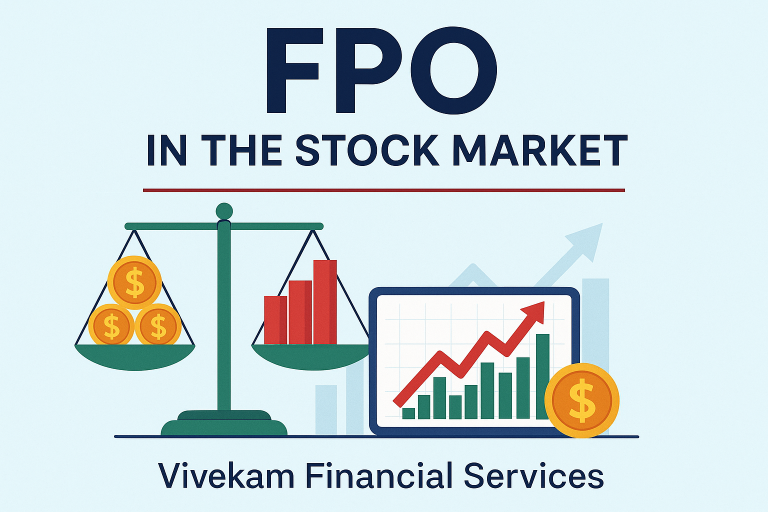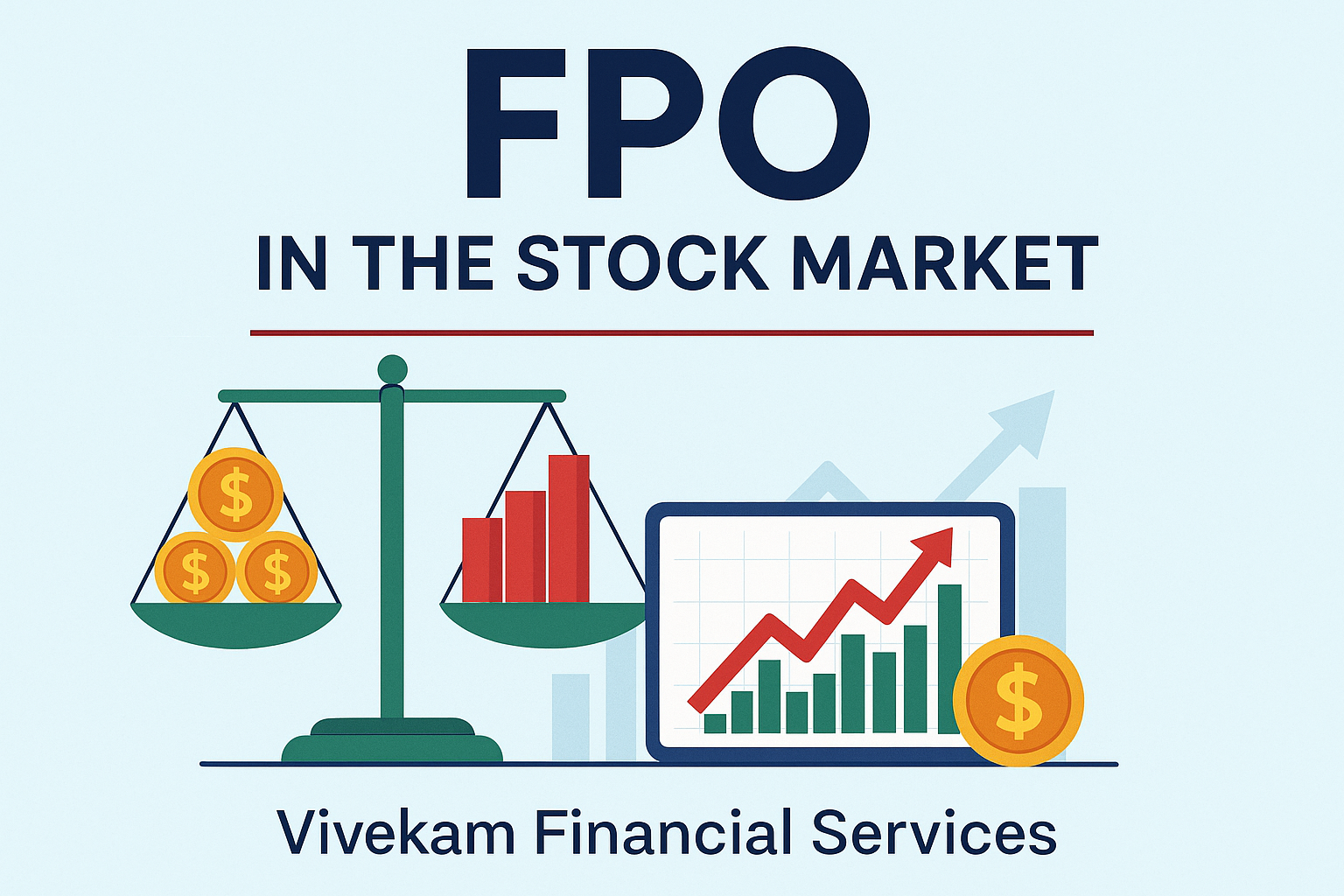FPO in the Stock Market: Meaning, Types, Examples & Key Advantages

Understanding What FPO Means
The stock market can be confusing for new investors, but understanding an FPO can help you spot great investing opportunities. When a listed company needs more capital, improve debt, or bring in fresh liquidity, it can launch something known as a Follow-on Public Offer (FPO).
FPO Full Form Explained
The FPO full form is Follow-on Public Offer.
This occurs when a company already trading on a stock exchange issues shares again to the public.
While IPOs introduce a company to the market, FPOs help a company grow further.
What is FPO in the Stock Market?
If you’ve ever wondered What is FPO in stock market, here’s the simplest explanation:
An FPO is a way for a listed company to raise additional funds by selling new or existing shares. Investors get another chance to buy shares—often at a discounted price.
Why Companies Issue an FPO
Companies choose FPOs to:
- Strengthen their balance sheet
- Reduce excessive debt
- Finance new expansion projects
- Improve liquidity
- Allow promoters to dilute stake in a controlled way
FPO vs IPO: Key Differences
Although both involve issuing shares, FPO vs IPO is a common comparison among market learners. Here’s what separates them:
Purpose and Timing
- IPO: Company enters the stock market for the first time.
- FPO: Company is already listed and needs additional funds or restructuring.
Investor Participation
IPOs attract hype-driven investors.
FPOs attract value-driven investors who rely on the company’s proven track record.
Price Discovery Mechanism
IPO prices are based on aggressive growth predictions.
FPO prices, however, are grounded in real-time market valuation.
Types of FPO (Detailed Breakdown)
FPOs come in two main types. Understanding each helps investors make smarter decisions.
Dilutive FPO
A dilutive FPO increases the number of outstanding shares.
How Dilutive FPO Expands Total Shares
New shares are created and added to the existing pool.
This temporarily increases supply, which may cause minor short-term price pressure.
Impact on Share Price and EPS
More shares = lower EPS.
However, if the capital raised improves profits later, the long-term impact can be positive.
Non-dilutive FPO
A non-dilutive FPO involves existing shareholders, usually promoters, selling their holdings.
How Existing Shares Are Sold
Here, no new shares enter the market.
Only ownership shifts from promoters to public investors.
Effect on Shareholding Structure
Promoters reduce control, improving transparency—often seen as positive by institutional investors.
Benefits of FPO for Companies
Raising Additional Capital
An FPO allows companies to raise large sums quickly—without relying on debt-heavy bank loans.
Improving Debt Position
Lower debt improves valuation, investor confidence, and credit ratings.
Funding Expansion Projects
Companies use the proceeds to expand operations, upgrade tech, or enter new markets.
Benefits of FPO for Investors
Lower Entry Price Opportunities
Investors often get shares at a discounted rate, creating a margin of safety.
Increased Market Liquidity
More publicly held shares mean smoother trading and better price stability.
Improved Corporate Governance after FPO
FPOs often push companies to adopt stronger regulations, better reporting, and transparent governance.
FPO Example (Realistic Scenarios)
Example of Dilutive FPO
A company with 10 crore shares issues 2 crore new shares to reduce debt.
Total shares rise to 12 crore → EPS falls temporarily → long-term gains possible if profits rise.
Example of Non-dilutive FPO
Promoters selling 8% of holdings to meet regulatory norms without issuing new shares.
Ownership diversifies but capital raised doesn’t go to the company directly.
Who Should Invest in FPO?
Long-term Value Investors
Ideal for investors who prefer companies with a proven record rather than brand-new IPO entrants.
Investors Seeking Lower Risk Entry
FPOs provide more data, financial history, and transparency than IPOs.
Ideal Market Conditions for Investing
Stable or bullish markets make FPOs more attractive because companies typically price them at discounts.
Risks and Considerations Before Investing in an FPO
Dilution Risk
Too many new shares can weigh down EPS temporarily.
Market Sentiment Risks
If the market mistrusts the purpose behind an FPO, demand may weaken.
Promoter Exit Risk in Non-dilutive FPO
A sudden promoter exit may signal internal challenges.
How to Apply for an FPO
ASBA Process
Funds stay blocked until allotment—safe and simple.
Steps to Apply Through Broker Apps
Modern platforms like Zerodha, Groww, and Upstox allow 1-click FPO applications.
FAQs about FPO
Is FPO Good for New Investors?
If you prefer stability over hype, yes—FPOs offer safer opportunities than IPOs.
Can FPO Reduce Share Prices?
Dilutive FPOs can temporarily reduce prices due to share supply increase.
Is Dilutive FPO Better Than Non-Dilutive?
Dilutive helps company growth; non-dilutive changes ownership. Both have strategic value.
How Is the Price of FPO Determined?
Based on demand, company valuation, and regulatory guidelines.
Can Retail Investors Apply for FPO?
Yes—open to all categories, including retail, NII, and institutional investors.
Should I Prefer IPO or FPO?
IPOs are high-reward & high-risk.
FPOs provide stability & lower risk.
Conclusion: Why FPOs Matter in Today’s Market
FPOs are essential tools for raising funds and improving liquidity. For investors, they offer safer, price-friendly opportunities compared to IPOs. Understanding FPO meaning, FPO vs IPO, FPO types, and benefits of FPO can help you invest more confidently and strategically.







